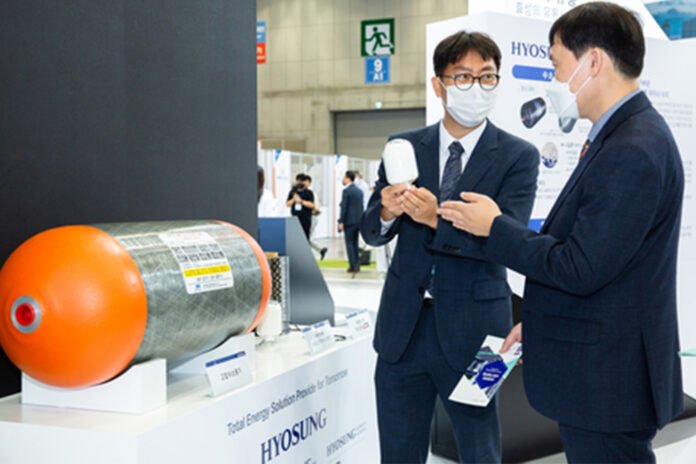To ensure the safety of hydrogen storage, the metal liner material of the hydrogen storage tank is generally aluminum 6061 or 7060, steel (inox or Chrome Molybdene). However, Hyosung TNC successes in the development and utilization of nylon as a Liner material for hydrogen fuel tanks for the first time in Korea. Nylon is a lighter material than metal and conventional plastic materials, and excellent hydrogen leakage cut-off effect
The perfect substitution in the monopoly market of foreign companies and secure the technology to lead the hydrogen market A core material that will complete the value chain from hydrogen production to storage and utilization
The nylon liner material developed by Hyosung TNC is 70% lighter than metal and 50% lighter than HDPE, and the gas barrier property that prevents hydrogen gas leakage is also 30% higher than metal and 50% higher than metal HDPE. The metal liner is heavy and has a high risk of brittleness when exposed to hydrogen for a long period, whereas nylon liner has low hydrogen absorption and air permeability, so there is no risk of brittleness. HDPE liners are used as high-pressure containers at 400bar levels but cannot withstand the 700bar pressure required by typical hydrogen electric vehicles.
In addition, the hydrogen container liner must withstand rapidly changing temperature fluctuation caused by frequent charging and discharging of hydrogen, and the nylon liner has excellent impact resistance against it from -40 to 85 degrees Celsius.
Hyosung TNC’s nylon-applied hydrogen container passed the hydrogen container international quality standard (UN/ECE R134) in June and has been equipped with function, quality, and technical perfection as a liner material. It also plans to conduct commercial tests with hydrogen fuel tank manufacturers and automakers.
Hyosung TNC is planning to expand the application of nylon as a liner material from tube trailers of commercial trucks to CNG and hydrogen vessels sailing the seas around the world, such as Antarctica and the Equator, by enhancing the impact and heat resistance range from -60 to 90 degrees Celsius. In addition, as Hyosung TNC developed the world’s first recycled nylon fiber technology from recycled fishing nets discarded in the sea, it plans to expand the eco-friendly plastic material market by applying recycled nylon to a liner material in the future.



